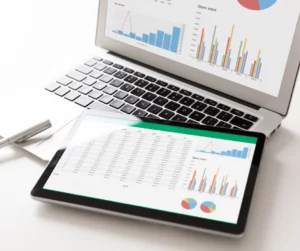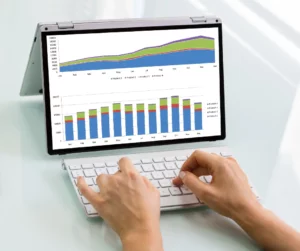Google recently announced the termination of Google Analytics Universal Analytics (UA) in July 2023. For now, it is beneficial to run Universal Analytics in conjunction with the new analytics platform, Google Analytics 4 (GA4). We will outline what these changes mean for your website analytics and how to navigate during this transition. Do you need help navigating this transition? Contact us!
The Basics
To know how to use GA4 and to understand the changes being made within analytics programs, you need to know the baseline of Universal Analytics. Universal Analytics is a web-only analytics property, while GA4 properties can process data from websites and apps. The categorization of data collection in UA was based on “hit type”, meaning each data point was classified separately. Page views, events, transactions, user timing, and app or screen views are classified as hit types in UA, while those will all be classified as individual events under GA4.
What is GA4?
To better understand the consumer journey, GA4 is a brand-new property created for the future of measurement. It works by:
- Utilizing event-based data rather than session-based data
- Including privacy protections including cookieless measurement, behavioral modeling, and conversion optimization
- Offering guidance without complex models through predictive capabilities
- Using direct integrations with media platforms aid in generating activity on your app or website
Changing Metrics in GA4
If you’re a UA user, then you know that the main metric measured is bounce rate. In GA4, bounce rate is not included as a standard metric, but instead, user engagement is a standard data point. GA4 will track engaged sessions, which are sessions that last longer than 10 seconds, has a conversion, or has 2+ page views. It will also track how often engaged sessions occur and how many engaged sessions occur per user.
Google Tag Manager (GTM) Changes
As we transition from UA to GA4, we must know about “events” as a data term. In UA, event data was collected by setting up tags and triggers in GTM to be sent to Google Analytics. In other words, when using UA, a website manager must create data tracking codes manually. In GA4, everything is automatically going to be collected as data. The start of a session triggers data tracking. For now, it is recommended to use GTM in conjunction with GA4, as the full transition to this new data tracking will not be fully in place until July 2023. The benefit of side-by-side use of GTM and GA4 will allow for internal link tracking, which is not automatically tracked.

Looking to Redesign Your Website? Contact Us for a Quote
Get StartedWhat You Need To Do
Switch to GA4
The optimal time to make the changeover is right away so that your GA4 account can collect the data required for automatic insights, even though you have some time before the change takes effect. You should set up a GA4 property in addition to your present UA property if you are already utilizing UA. Utilize the GA4 Setup Assistant from Google, which allows you to configure it using your current tagging.
Refer to Google’s website on how to upgrade to Google Analytics 4, which breaks the process down into 12 parts with varying degrees of work for each step, if you employ advanced features like Google Ads, ecustom events, or other sophisticated capabilities.
Adjust Conversion Tracking
You’ll be able to view Analytics data in your Google Ads account after your GA 4 property is configured. If you have conversion tracking set up, you should remove any UA objectives to prevent duplicates and import Analytics conversions into Google Ads.
Export Reports
After July 1, 2023, Google will still give you access to your Universal Analytics data for at least six months. During this time, you should export the data that matters to you. Three methods exist for exporting:
- Export individual reports
- Use GA Reporting API
- Export to BigQuery
Contact Compete Now for Google Analytics Support
Need help migrating to GA4? Click here or call 617-539-6528 to get started with us!



